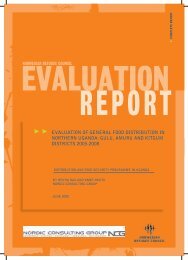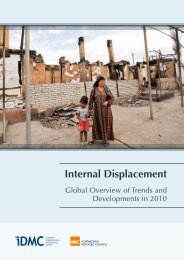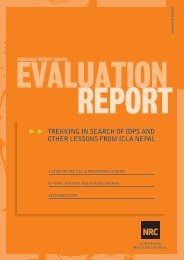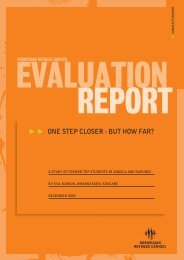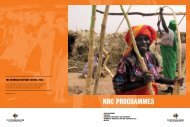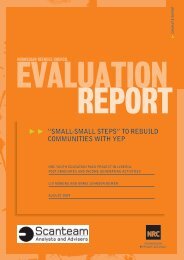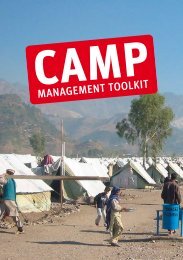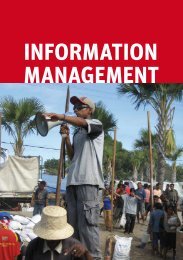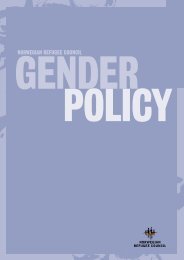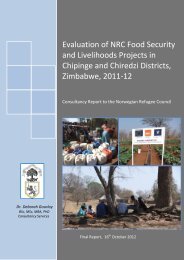Download report here - Norwegian Refugee Council
Download report here - Norwegian Refugee Council
Download report here - Norwegian Refugee Council
- No tags were found...
You also want an ePaper? Increase the reach of your titles
YUMPU automatically turns print PDFs into web optimized ePapers that Google loves.
4 Main Findings4.1 Mediation Support in the UN SystemThe evaluation team took into account the organisational environment and positioning ofmediation support within the UN system in order to have a better understanding of thepotential and limitations of the usage of the SBT. For that purpose, we will briefly outline thehistory and mandate of the MSU within the DPA and reflect upon the overall concept ofmediation support.Establishment of the Mediation Support UnitPursuant to the decision in 2005 by member states to support strengthened good officescapacity, including in the mediation of disputes (paragraph 76 of Outcome Document), in2006 2007, the United Nations Department of Political Affairs (UNDPA) established a smallMediation Support Unit (MSU).Based in the DPA, the MSU describes itself as a system-wide asset which supportsmediation initiatives of the United Nations, its member states, regional and sub-regionalorganisations and other relevant partners. For this purpose, the MSU delivers services inthree key areas:a) Operational support (analytical support, deployment of experts and limited start-upfinancial support) to peace processes.b) Strengthening mediation capacity of the United Nations, its member states, regionaland sub-regional organisations and national actors to be effective in mediation and itssupport activities.c) Capture, develop and share mediation knowledge, policy and guidance, lessonslearned and best practices.As we learned during our evaluation in New York, the establishment of the MSU wasaccompanied by organisational challenges in a complex political environment. Within theUNDPA, for example, which is mainly structured according to regional responsibilities, t<strong>here</strong>were a number of reservations with respect to the usefulness and necessity of establishing aseparate unit dealing with mediation issues. Many staff members of the regional divisionswithin the DPA considered mediation issues and mediation support as part of their corebusiness. The fact that the UNDPA is <strong>report</strong>edly an under-resourced and under-staffedorganisation contributed to the perception that the MSU could be perceived as a potentialcompetitor for scarce but urgently needed resources.For this reason, the MSU had to proceed carefully in inserting itself within the DPA system.Its main challenge was to show that mediation support does not compete with butcomplements and supports existing capacities within the DPA, thus providing value added tothe already existing work. The MSU was under pressure to prove to the DPA that theservices which it provides were in fact useful for the regional divisions and their respectivecountry teams/field missions. In that sense, the beginning of the MSU was marked by a needfor confidence building, networking and diplomacy within its own system.The insecurity felt by some UNDPA staff members can also be related to the fact that theUNDPA itself which, according to a UN senior official was traditionally a department ofthinkers, has been undergoing rapid organisational change in the last few years towards amore operational entity which involved substantive role clarification with other UN agencies,especially the UNDPKO and the UNDP.8




